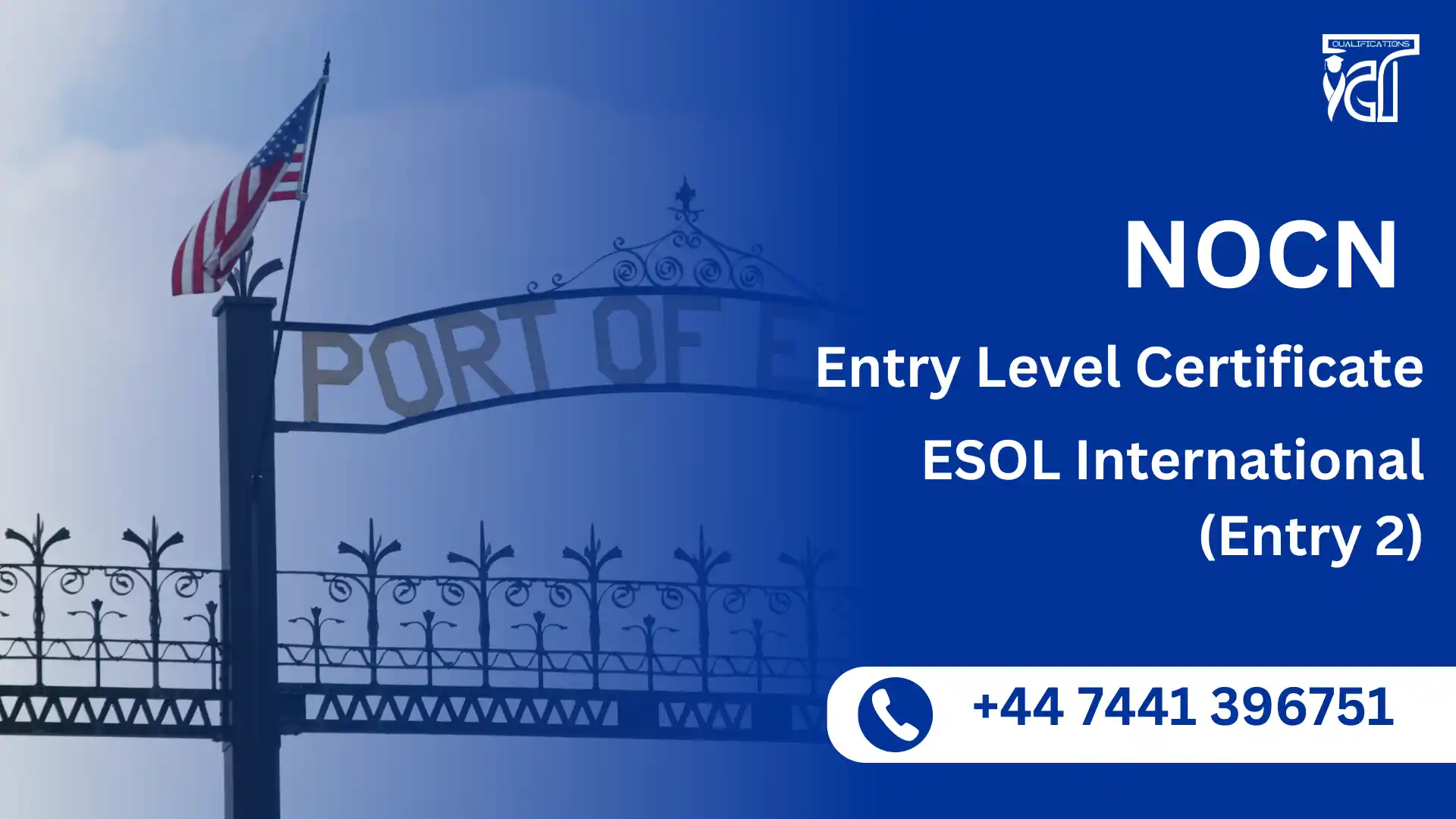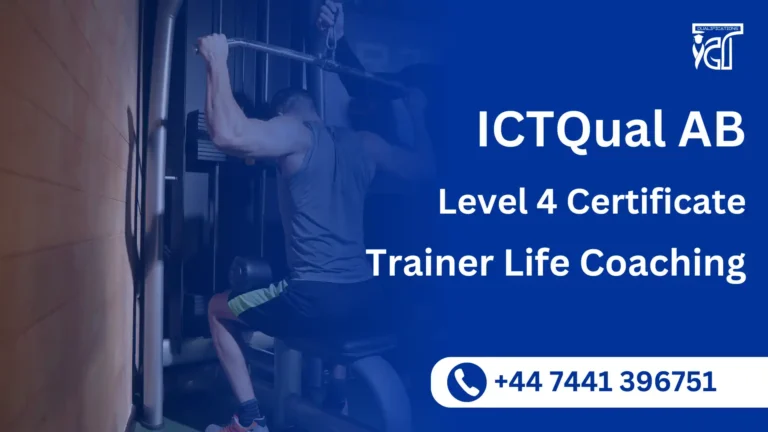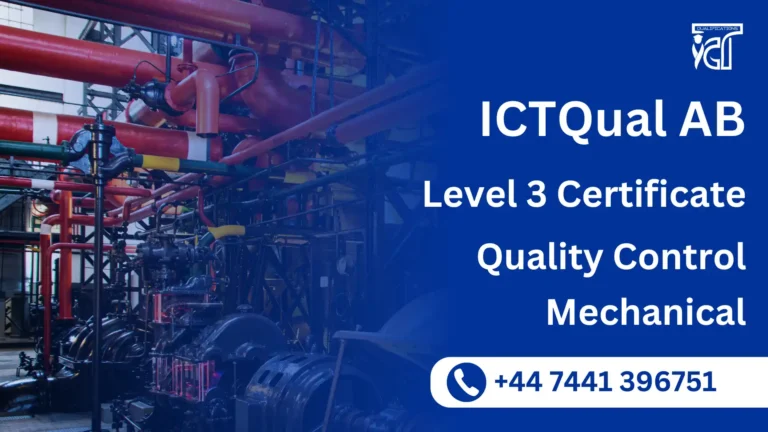The NOCN Entry Level Certificate in ESOL International (Entry 2) is an Ofqual-regulated qualification designed to support non-native English speakers who are looking to develop their language skills at a fundamental level. This course is ideal for learners with a basic understanding of English, enabling them to improve their proficiency in speaking, listening, reading, and writing. Whether you’re looking to enhance your ability to communicate in everyday situations, integrate into an English-speaking environment, or lay a solid foundation for further language study, this qualification provides the necessary tools.
The course focuses on practical language skills that can be immediately applied in real-life contexts, such as shopping, interacting with colleagues, or understanding simple written instructions. It’s particularly beneficial for adult learners, immigrants, or refugees who wish to improve their English for personal, social, or professional purposes. The qualification is assignment-based, allowing learners to progress at their own pace without the pressure of formal exams. This flexible approach makes it ideal for individuals balancing learning with other commitments.
Upon completing the NOCN Entry Level Certificate in ESOL International (Entry 2), learners will have the confidence to engage in basic conversations, understand simple written texts, and communicate effectively in various social and professional situations. The course serves as a stepping stone for those looking to progress to more advanced levels of English proficiency, such as Entry 3 or Level 1 ESOL qualifications.
NOCN Entry Level Certificate in ESOL International (Entry 2)
NOCN Entry Level Certificate in ESOL International (Entry 2) program consist of 300 TQT (Total Qualification time) and 30 Credit Value.
Mandatory units
| Sr# | Unit Title |
|---|---|
| 1 | ESOL International Reading |
| 2 | ESOL International Speaking and Listening |
| 3 | ESOL International Writing |
GLH (Guided Learning Hours) and TQT (Total Qualification Time) are terms commonly used in vocational qualifications to help define the amount of time a learner is expected to spend on heir studies.
1. GLH (Guided Learning Hours)
GLH refers to the number of hours a learner spends being directly taught, supervised, or supported during their course. This includes the time spent in activities such as:
- Classroom instruction
- Practical workshops
- One-on-one tutoring or mentoring sessions
- Online learning sessions with tutor support
In other words, GLH represents the time that learners are actively engaged with their instructors or learning activities.
2. TQT (Total Qualification Time)
TQT represents the total amount of time a learner is expected to invest in completing a qualification, including:
- GLH (Guided Learning Hours): Time spent on direct learning, as explained above.
- Self-Directed Learning: This includes time spent on independent study, research, assignment completion, preparation for exams, and any other work the learner does outside of direct teaching hours.
TQT is a broader measure that includes all the time required to achieve the qualification. It helps learners and employers understand the overall commitment required for the qualification.
Key Differences Between GLH and TQT:
- GLH focuses on direct learning with guidance or supervision.
- TQT includes GLH as well as independent study time and other learning-related activities.
Example:
If a qualification has a TQT of 600 hours and a GLH of 250 hours, it means the learner should spend 250 hours in direct learning (classroom, online, or tutor-led sessions) and 350 hours on independent study or research.
Learning Outcomes of NOCN Entry Level Certificate in ESOL International (Entry 2)
ESOL International Reading
- Understand simple written texts in English, including everyday materials such as advertisements, forms, instructions, and signs.
- Identify key information in short texts, including names, numbers, and dates.
- Comprehend simple vocabulary used in common situations such as shopping, travel, and basic communication.
- Follow written instructions in familiar contexts, such as completing forms or understanding basic directions.
- Demonstrate understanding of basic information in written form by answering simple questions related to the text.
ESOL International Speaking and Listening
- Engage in simple conversations on familiar topics, including personal information, daily routines, and needs.
- Listen and respond appropriately to basic spoken English in real-life situations, such as greetings, asking for help, or making requests.
- Understand and follow simple instructions in conversations or in practical contexts, such as at the store, on public transportation, or in the workplace.
- Express personal opinions or preferences using basic vocabulary and sentences, with the ability to ask and answer simple questions.
- Demonstrate clear pronunciation and use of simple language, making it easy for others to understand in common conversational settings.
ESOL International Writing
- Write simple texts in English, such as short letters, emails, or postcards, on familiar topics like family, hobbies, or daily activities.
- Form basic sentences with correct word order and use basic punctuation (full stops, commas, etc.) to write clear, simple messages.
- Fill in forms or complete basic written tasks with relevant information such as personal details, address, and simple descriptions.
- Demonstrate understanding of sentence structure, ensuring that writing conveys clear and simple information.
- Use basic vocabulary to write short, clear paragraphs about familiar topics and activities, ensuring clarity and coherence.
Course Benefits of the NOCN Entry Level Certificate in ESOL International (Entry 2)
1. Globally Recognized Qualification
The NOCN Entry Level Certificate in ESOL International (Entry 2) is Ofqual-regulated, making it a recognized qualification that holds value internationally. This certification is widely acknowledged by employers, educational institutions, and government bodies, proving your ability to communicate effectively in English. Whether you are looking to improve your career prospects or further your education, this qualification gives you a recognized achievement in English language proficiency.
2. Practical Language Skills
The course focuses on developing real-world English language skills. By learning how to read simple texts, speak clearly, and write basic messages, learners are prepared to navigate everyday situations with confidence. Whether it’s shopping, traveling, or interacting with others in a community or workplace, this qualification equips learners with practical skills that can be immediately applied in real life.
3. Flexible, Assignment-Based Learning
This course is entirely assignment-based, which provides a flexible learning approach. Students can work at their own pace, reducing the pressure of exams and allowing them to learn in a way that fits their individual schedules. This is particularly beneficial for individuals who are balancing learning with other commitments such as work or family responsibilities.
4. Confidence in Communication
Upon completion of the course, learners will have the confidence to engage in basic conversations, understand written instructions, and express themselves in writing. This helps build self-esteem and promotes greater integration into English-speaking environments, whether for personal, social, or professional purposes.
5. Clear Progression Path
The NOCN Entry Level Certificate provides a solid foundation for learners who wish to advance their English proficiency further. After completing Entry 2, learners can progress to higher-level qualifications such as Entry 3 or Level 1, continuing their journey toward mastering the English language.
This course not only provides immediate benefits in communication but also sets learners up for future academic and professional opportunities.
Ideal Learner for the NOCN Entry Level Certificate in ESOL International (Entry 2)
1. Non-Native English Speakers with Basic Skills
The NOCN Entry Level Certificate in ESOL International (Entry 2) is perfect for non-native English speakers who have a basic understanding of English but wish to improve their proficiency in the language. Ideal learners are individuals who are familiar with basic English vocabulary and simple phrases but need structured learning to build confidence in using the language in everyday situations.
2. Adult Learners Seeking Personal Development
This course is particularly well-suited for adult learners who want to enhance their English language skills for personal or professional reasons. Whether you’re a mature student, an immigrant, or someone seeking to improve communication abilities for daily activities, this qualification provides the fundamental language skills needed to engage in common tasks, such as shopping, interacting with colleagues, or handling basic administrative duties.
3. Learners with Limited Time for Studies
The assignment-based learning structure of the NOCN Entry Level Certificate appeals to those who may not have the time or resources for traditional exam-based courses. It is an ideal option for individuals who prefer to study at their own pace while balancing other commitments, such as work or family. This flexibility allows learners to progress through the course at a comfortable speed, ensuring they have enough time to grasp each concept.
4. Individuals Preparing for Higher-Level ESOL Qualifications
This course also caters to individuals who aim to progress to more advanced levels of English proficiency. It provides a solid foundation for learners who may eventually wish to pursue further qualifications, such as Entry 3 or Level 1 ESOL, or other professional development opportunities. Those looking to build a career or study further in English-speaking environments will find this course a valuable first step.
5. Immigrants and Refugees Seeking Integration
The NOCN Entry Level Certificate is highly beneficial for immigrants or refugees who want to integrate into English-speaking communities. This qualification helps learners gain essential communication skills to navigate daily life, seek employment, and engage with others more effectively. It provides a critical foundation for those looking to settle in English-speaking countries and feel more confident in social and professional interactions.
Entry Requirements
Register Now
Qualification Process
Qualification Process NOCN Entry Level Certificate in ESOL International (Entry 2)
- Self-Assessment:
Begin by evaluating your eligibility to ensure you meet the qualification requirements, including work experience, knowledge, and language proficiency. - Registration:
Complete your registration by submitting the required documents, including a scanned copy of a valid ID, and paying the registration fee. - Induction:
An assessor will conduct an induction to confirm your eligibility for the course and explain the evidence requirements. If you do not meet the criteria, your registration will be canceled, and the fee will be refunded. - Assignments & Evidence Submission:
Provide all assignments and the necessary evidence based on the assessment criteria outlined in the course. If you are unsure of the required evidence, consult with the assessor for guidance on the type and nature of evidence needed. - Feedback and Revision:
The assessor will review your submitted evidence and provide feedback. Evidence that meets the criteria will be marked as “Criteria Met,” while any gaps will be identified. You will be asked to revise and resubmit if needed. - Competence Evidence:
Submit final evidence demonstrating that all learning outcomes have been met. This evidence will be marked as “Criteria Met” by the assessor once it is satisfactory. - Internal Quality Assurance (IQA):
The Internal Quality Assurance Verifier (IQA) will review your evidence to ensure consistency, quality, and compliance with standards. - External Verification:
The IQA will submit your portfolio to NOCN External Quality Assurance Versifier (EQA) for final confirmation. The EQA may contact you directly to verify the authenticity of your evidence. - Certification:
Upon successful completion of all checks, NOCN will issue your official certificate, confirming that you have attained the NOCN Entry Level Certificate in ESOL International (Entry 2)







